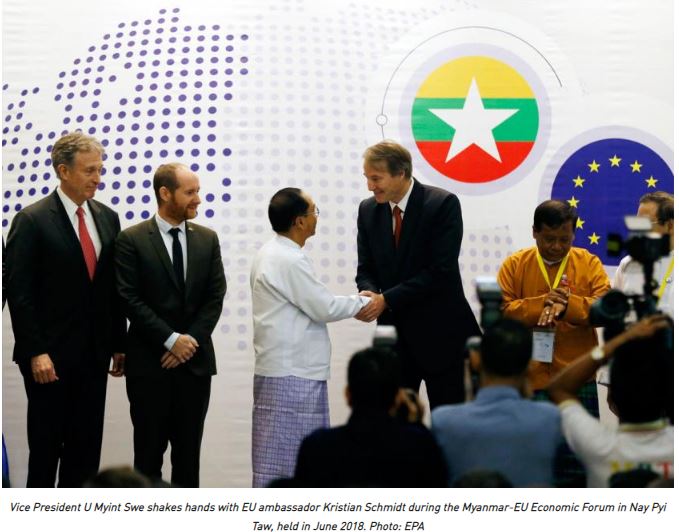Foreign business leaders join call for investments in Myanmar
The leaders of seven foreign business groups in Yangon have signed an open letter calling on investors abroad to put their money in Myanmar, stressing the critical role foreign direct investment (FDI) plays in the country’s transition.
“Having been in isolation for so long, Myanmar now requires the broad regeneration of its economy to meet the demands of modern-day trade. As a result, there exists a significant range of private sector investment opportunities across every sector of the economy,” the letter said, citing the opportunities presented in the Myanmar Sustainable Development Plan (MSDP) which was announced by Nay Pyi Taw last year.
It was co-signed by the British, Australian, American, European, Italian, German and French chambers of commerce in Myanmar. These groups together have more than 600 companies from over 30 countries.
“Existing investments by our members contribute significantly to transformative social and economic development from within Myanmar,” it went on.
Peter Beynon, British Chamber of Commerce chair and one of the signatories, said the trade groups wanted to tell the wider international business community that “we are here working today with the people of Myanmar for a better tomorrow.”
“We wanted to get the message ‘out there’ that business was incumbent and developing positively in Myanmar,” he added. In other words, it is to tell people that “it is better to ‘walk the talk’ than to carp at the sidelines and only ‘talk the talk’.”
Highlighting Chinese, Japanese, Korean and Southeast Asian investments in Myanmar, the letter emphasised that it is “responsible, sustainable investment and day-to-day engagement on the ground in the country” that can help Myanmar secure growth, peace and stability. Engagement, not isolation, results in bringing in “established international standards of corporate governance and sustainable responsibility.”
The clarion call from foreign business leaders came after State Counsellor Daw Aung San Suu Kyi’s appeal to global investors last month. At the Invest Myanmar Summit, she touted the country’s investment opportunities, its low labour costs, strategic location and potential in human capital and pledged to attract more than US$200 billion in investment over the next two decades.
According to the figures from the Directorate of Investment and Company Administration’s (DICA) permitted FDI by country, as of December 2018, the UK is the only “western country” among the biggest investors. Britain ranked fifth with a total of US$4.5 billion; while France, with $549 million, and the US, with $432 million, ranked twelfth and thirteenth respectively. These figures do not include investments made through Singapore or Hong Kong, or those flowing into Thilawa Special Economic Zone.
In comparison, the highly controversial Myitsone dam, backed by China, alone involves $3.6 billion investment.
Meanwhile, trade with “Western” economies has been critical for Myanmar’s economic growth. The country’s fast-expanding export industries have benefitted hugely from its tariff-free access to the EU market since 2013, creating hundreds of thousands of job. However, Brussels is currently considering ending Myanmar’s trade privileges due to alleged human rights violations in northern Rakhine.
Positives of business
Chris Hughes, chair of AustCham Myanmar, said the letter was to tell investors in their respective home markets that “good business can and is being be done in Myanmar right now”, as well as to say to Myanmar businesses that foreign investors are “not a threat”.
The letter mentioned that Western exporters of value-added products and services can support new tax revenues, which in turn can fund the expansion of public services.
AustCham’s message for Australian stakeholders and investors is that “we can make a difference by getting closer not standing back”, Mr Hughes added.
The seven business groups attended a meeting with Myanmar Investment Commission chair U Thaung Tun in mid-2018. “At the meeting we were united, the government and the incumbent business community, to promote the ‘positives’ of doing business in Myanmar,” Mr Beynon said. The business chiefs wanted to promote how engagement “was more effective than negative rhetoric and isolationism that was being promoted against the country in the wake of the negative publicity emanating from events in Rakhine”, he explained.
This amounts to a rare show of support for the National League for Democracy-led government from the international business community.
The incumbent administration has struggled to attract strong support for its handling of the economy over the last two years. Approved FDI fell short of the official estimates by around 50 percent between April and October 2018, while tourist arrivals from Europe and America have also fallen. A survey for European companies last December revealed that business confidence has fallen to a three-year low.
In the face of the challenges, the joint letter seeks to encourage reformers in Nay Pyi Taw to “continue down the path of economic and political reform as we believe that this will bring more and better investment to Myanmar,” Mr Hughes commented.
Source: https://www.mmtimes.com/news/foreign-business-leaders-join-call-investments-myanmar.html


 Thailand
Thailand




